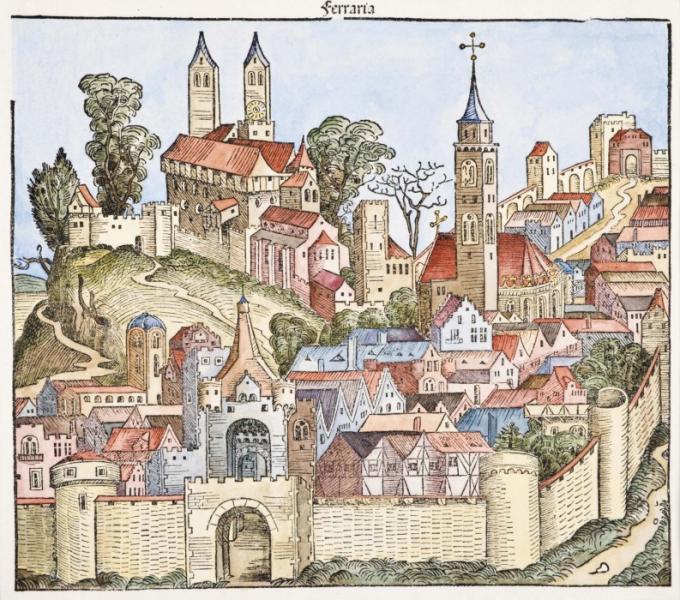After completing his two years in Padua, Copernicus was to return to Warmia and present his doctorate in law.
Rising prices in the city prevented the future astronomer from pursuing his doctorate there, however, and so he left for nearby Ferrara, called refugium pauperorum (paupers’ refuge) because of the cheap cost of doctoral examinations.
Ruled by the influential d’Este family, Ferrara was an important cultural and academic centre in the 15th c. and the 16th c. The university founded there in 1391 attracted many outstanding professors of law and medicine (e.g. Domenico Maria Novara - one of Copernicus’ mentors) and scholars from nearly all parts of Europe. In May 1503 Copernicus had to swear an oath that he had already completed the required jurist courses and pay the examination fee. The swearing-in ceremony took place in the ‘giuristici’ college at St Francis Cloister in May 1503. Copernicus also selected as his doctoral promoters the outstanding lecturers Filippo Bardella and Anton Leutus who had for a long time been associated with the university. In their presence Copernicus took all the required examinations on Decretes and Decretalia and earned a doctorate in Canon Law, receiving then the following doctoral insignia: a biretta and ring. After the official ceremony, the new doctor and his promoters took part in a small private party (conventus privatus).
Copernicus must have left Italy for Warmia shortly afterwards. He could have travelled back home taking the route crossing the Brenner Pass, and later on, after a stopover in Leipzig, continuing to Nuremberg where he could have admired the instruments Regiomontanus (Johannes Müller) used for astronomical observations and met representatives of the ‘Nuremberg School’ – geographers, cartographers, astronomers and mathematicians. It also seems plausible that he spent some time in Wrocław, where he took up his ‘scholasteria’ of the Holy Cross while he was making his way back to Prussia as a fledgling jurist ready to serve the Frombork chapter and the church in Warmia. He soon gained quite a reputation as an expert in Roman and Canon law, to which the number of legal books he had collected and the legal advice he offered might testify, for instance during conflicts over borders - between Bishop Mauritius Ferber (1471–1537) and Prince Albrecht Hohenzollern.
 English (United Kingdom)
English (United Kingdom)  Polski (PL)
Polski (PL) 






